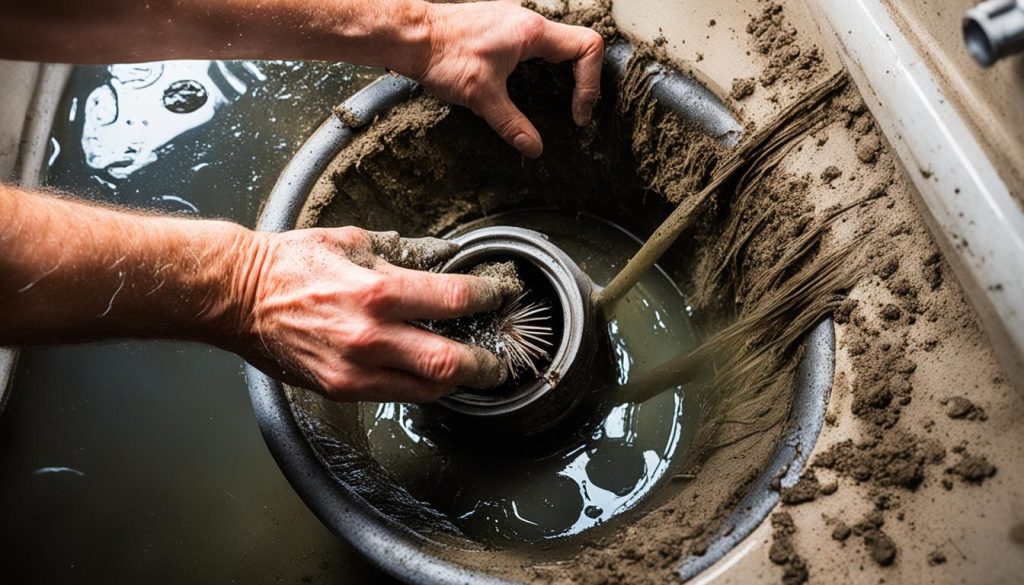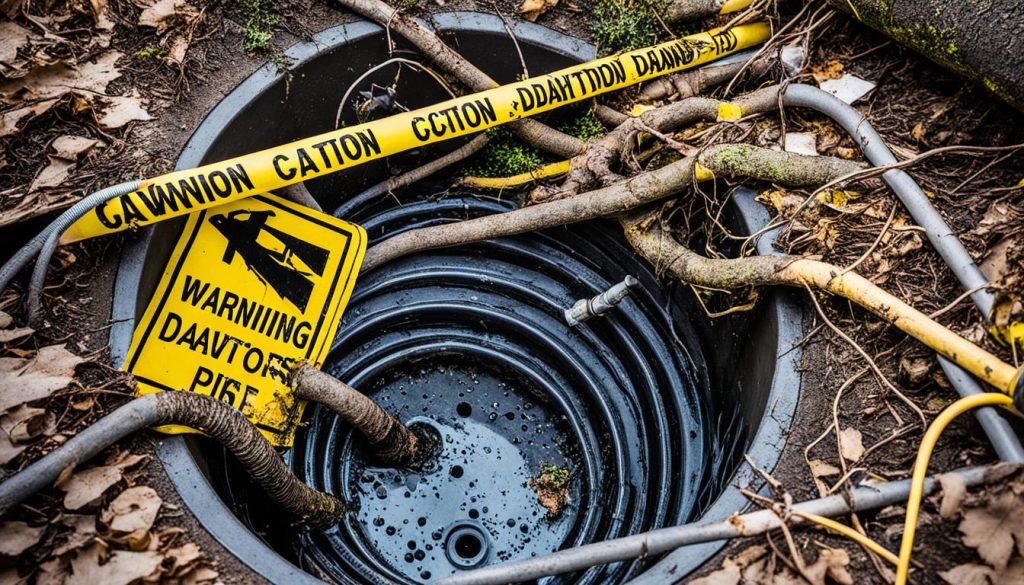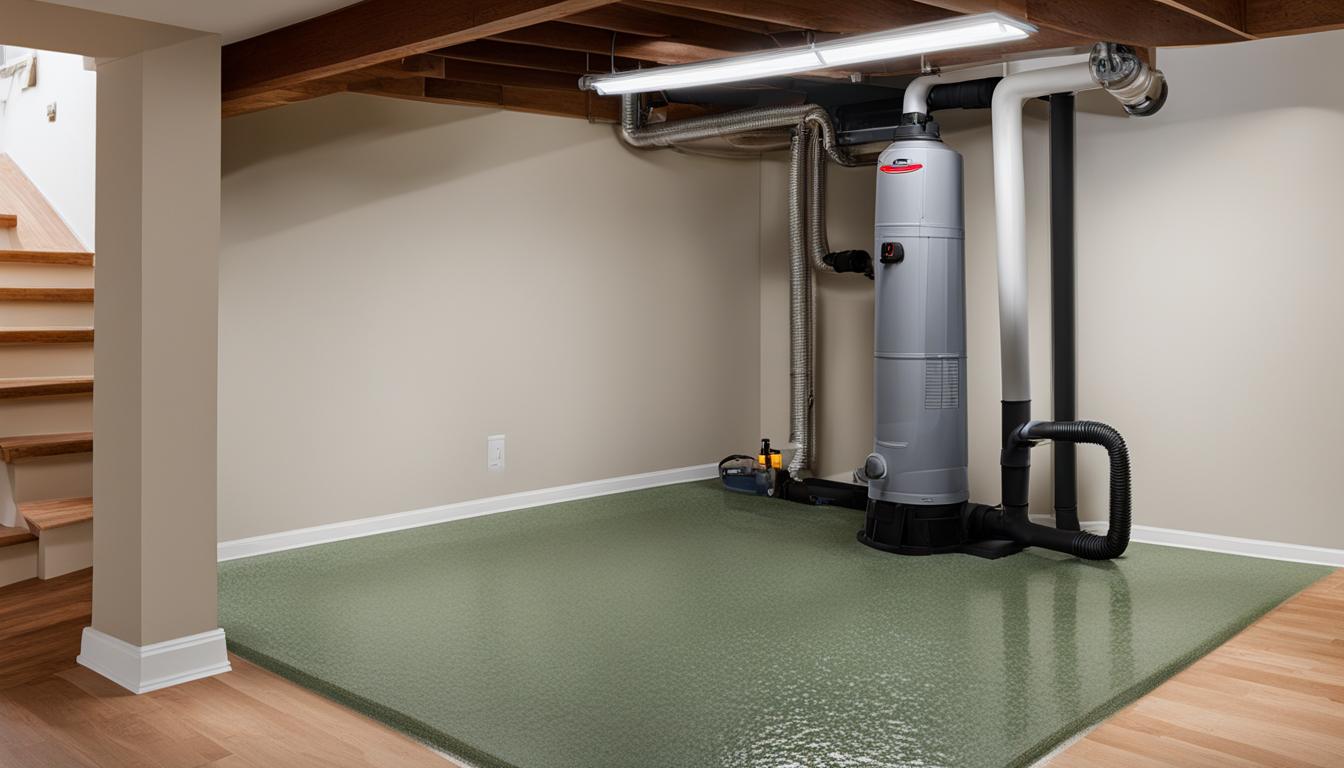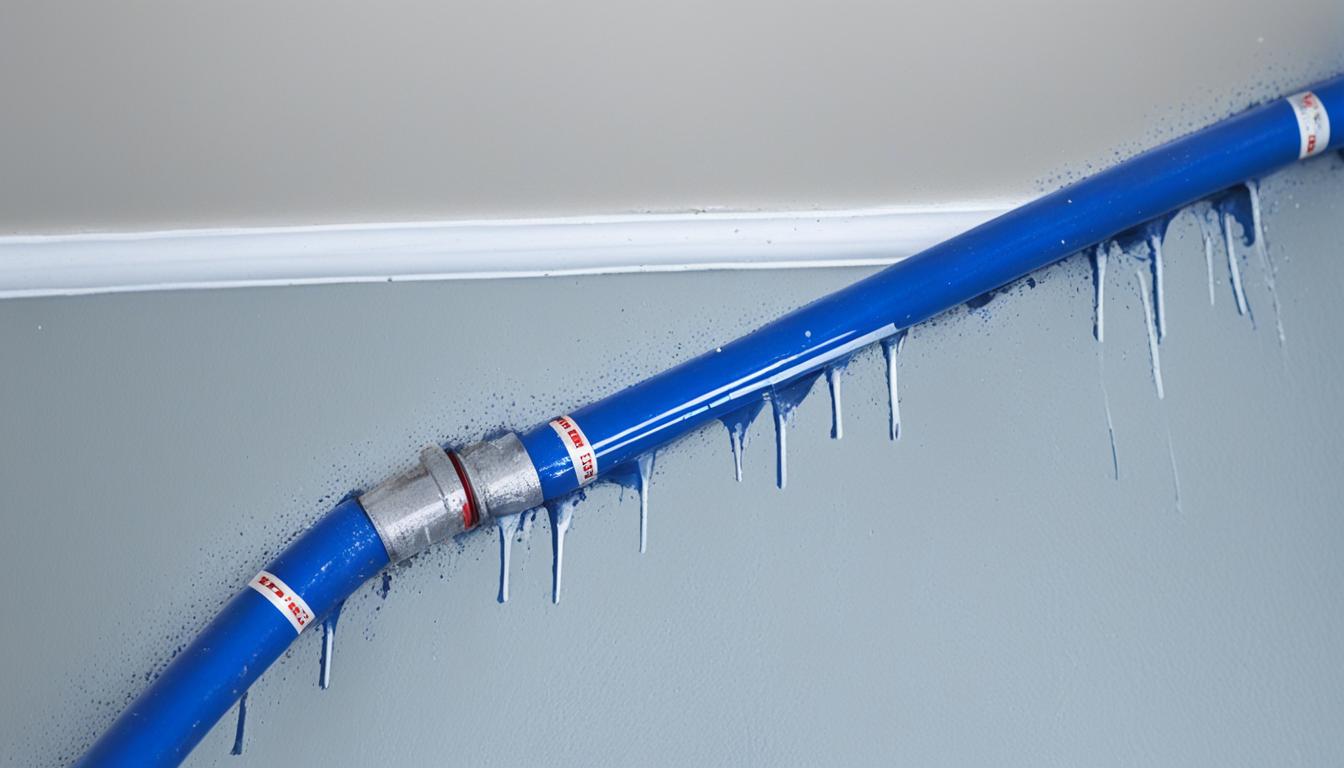Unveiling What May Be Inside of a Dirty Drain
Did you know that a clogged drain can contain a shocking amount of debris? In fact, it is estimated that the average clogged drain can accumulate up to several pounds of dirt, hair, soap scum, and other unpleasant substances.
Not only can a clogged drain cause a foul odor in your home, but it can also lead to serious plumbing issues such as backups and blockages. Cleaning out a drain is essential to maintain proper drainage and prevent costly repairs.
Key Takeaways:
- A clogged drain can contain several pounds of dirt, hair, and debris.
- Clogged drains can lead to foul odors and plumbing problems.
- Regular cleaning and maintenance of drains are necessary to prevent clogs and backups.
- Professional assistance may be required for stubborn drain blockages.
- Preventive measures, such as using drain covers and avoiding pouring oil and grease down drains, can help maintain clean and clear drains.
How to Prevent Drain Problems
To prevent drain problems, regular maintenance is key. Here are some tips to keep your drains flowing smoothly:
- Avoid pouring grease or oil down the drain.
- Use drain covers to catch hair and debris in bathroom drains.
- Flush drains with hot water regularly to remove build-up.
- Avoid flushing anything other than toilet paper down the toilet.
- Avoid putting large food scraps down the kitchen sink.
By following these maintenance tips, you can reduce the risk of clogged drains and keep your plumbing system in good condition.
| Preventive Measures | Bathroom Drains | Kitchen Drains |
|---|---|---|
| Avoid pouring grease or oil down the drain. | Use drain covers to catch hair and debris. | Avoid putting large food scraps down the sink. |
| Flush drains with hot water regularly. | ||
| Avoid flushing anything other than toilet paper down the toilet. |
Common Causes of Drain Clogs
Different drains in your home can become clogged due to various factors. It is important to understand the specific causes of clogs in different drains in order to prevent them and take the necessary steps to clear them.
Bathroom Sink Clogs
The most common cause of a clogged bathroom sink drain is the accumulation of hair and soap, which can clump together and block the flow of water. Over time, this build-up can restrict water drainage and result in a clogged sink.
Shower Drain Clogs
Hair, soap, and other debris can easily accumulate in the drain of your shower. As these substances combine and form a solid mass, the flow of water becomes restricted, leading to a clogged shower drain.
Toilet Clogs
Too much waste, clumped toilet paper, and foreign objects flushed down the toilet can cause a clogged drain. These items can accumulate and create a blockage, preventing the toilet from flushing properly.
Kitchen Sink Clogs
Food particles, grease, and other kitchen waste can accumulate in the drain of your kitchen sink. This can especially be the case if you have a garbage disposal connected to your sink. Over time, these substances can form a clog and impede the flow of water.
To give you a better understanding of the common causes of drain clogs, here is a table summarizing the information:
| Drain Type | Common Causes |
|---|---|
| Bathroom Sink | Hair and soap accumulation |
| Shower | Hair, soap, and debris accumulation |
| Toilet | Excessive waste, clumped toilet paper, and foreign objects |
| Kitchen Sink | Food particles, grease, and kitchen waste accumulation |
By being aware of these common causes of drain clogs, you can take proactive measures to prevent them and maintain a smoothly flowing plumbing system.
How to Clear a Clogged Drain
Clearing a clogged drain is essential for maintaining proper drainage in your home. The method you use to clear the clog depends on the location of the blockage. Here are some effective drain cleaning methods for different types of clogs:
Sink Drain
To clear a clogged sink drain, you can try the following methods:
- Pour a mixture of baking soda and vinegar down the drain, followed by hot water. This combination can help break down the clog and clear the pipe.
- Use a plunger to create a suction and remove the blockage. Make sure to cover the overflow opening with a wet cloth for maximum effectiveness.
- If the clog persists, you can use a drain auger to physically remove the obstruction.
Shower Drain
If you’re dealing with a clogged shower drain, you can try these methods:
- Remove the drain cover and use a plunger to create a seal. Pump the plunger vigorously to dislodge the clog.
- Alternatively, you can use a drain auger to break apart and remove the blockage.
- For mild clogs, the baking soda and vinegar method can be effective. Simply pour the mixture down the drain and rinse with hot water.
Toilet Drain
A clogged toilet drain requires specific techniques to clear the obstruction:
- Start by using a plunger to create a strong suction. Push and pull the plunger vigorously to break apart the clog and restore the flow.
- If the plunger doesn’t work, you can use a plumbing auger to physically remove the blockage from the toilet drain.
Kitchen Sink Drain
Clearing a clogged kitchen sink drain can be done through the following methods:
- Begin by clearing the garbage disposal. Make sure to turn off the power and remove any debris or objects that may be obstructing the blades.
- Next, try the baking soda and vinegar method. Pour the mixture down the drain and let it sit for a few minutes before flushing with hot water.
- If the clog persists, you can use a plunger or drain auger to clear the blockage.
By using these drain cleaning methods, you can effectively unclog sink drains, shower drains, toilet drains, and kitchen sink drains, restoring proper drainage in your home.
Warning Signs of a Damaged Sewer Line
A damaged sewer line can cause various issues in your home. Look out for the following warning signs of a damaged sewer line:
1. Sewage backups and blockages in multiple drains
If you experience sewage backups or blockages in multiple drains, it could be a sign of a damaged sewer line. This can occur when the line is blocked or has suffered damage, preventing proper wastewater flow.
2. Sewer gas odor in or around your home
If you notice a foul sewer gas odor in or around your home, it could indicate a damaged sewer line. Sewer gas consists of harmful gases like hydrogen sulfide, which can pose health risks if inhaled.
3. Mold growth, especially accompanied by sewer odor
Mold growth, especially accompanied by a sewer odor, can be a sign of a damaged sewer line. The moisture from a leakage or backup can create an ideal environment for mold growth, posing health risks to you and your family.
4. Slow draining in multiple drains
If you experience slow draining in multiple drains, it may indicate a blockage or damaged sewer line. This can disrupt the proper flow of wastewater and lead to backups and other plumbing issues.
If you notice any of these warning signs, it is crucial to have a professional plumber conduct a sewer inspection. They can identify the root cause of the problem and provide the necessary repairs or replacements to restore your sewer line’s functionality.
| Warning Signs | Description |
|---|---|
| Sewage backups and blockages in multiple drains | Indicates a blockage or damage in the sewer line, causing wastewater backups and blockages in various drains. |
| Sewer gas odor in or around your home | Foul odor resembling rotten eggs is an indication of sewer gas leakage, potentially resulting from a damaged sewer line. |
| Mold growth, especially accompanied by sewer odor | Mold growth caused by moisture from a sewer line leak, often accompanied by a sewer odor, can lead to respiratory issues. |
| Slow draining in multiple drains | The slow drainage of multiple drains points to a clog or damage in the sewer line, hindering proper wastewater flow. |
Consequences of Ignoring Sewer Line Problems
Ignoring sewer line problems can lead to serious consequences. It’s crucial to address these issues promptly to avoid further damage and potential hazards. Let’s explore the various consequences of ignoring sewer line problems:
1. Foundation Damage
A leaking sewer line can have a detrimental impact on your home’s foundation. Over time, the constant exposure to water can cause settlement and cracks, compromising the structural integrity of your property. Repairing foundation damage can be an expensive and time-consuming process.
2. Costly Repairs
When sewer line problems are left untreated, they can escalate and result in extensive and costly repairs. The longer you ignore the issues, the more severe they can become, requiring more complex and expensive solutions. Addressing the problems early on can help you save both time and money in the long run.
3. Health Hazards
Sewer line problems can introduce health hazards into your living environment. Sewer gas odor, mold growth, and insect infestations are common consequences of untreated sewer line issues. These hazards can pose a risk to the health and well-being of you and your family. Promptly addressing sewer line problems can help mitigate these health risks.
4. Sinkholes
If a sewer line leak goes untreated, it can lead to soil erosion and the formation of sinkholes. Sinkholes can be extremely dangerous and cause significant damage to your property. They can swallow up parts of your yard, driveway, or even your home. By acting quickly to repair sewer line issues, you can prevent the formation of sinkholes and protect your property.
To avoid the potentially severe consequences of ignoring sewer line problems, it is vital to promptly address any issues and seek professional assistance. By doing so, you can protect your foundation, avoid costly repairs, maintain a healthy living environment, and prevent the formation of sinkholes.
How to Protect Your Sewer Line
Taking preventive measures can help protect your sewer line. Here are some tips:
- Avoid planting trees near the sewer line to prevent root intrusion.
- Schedule regular professional sewer cleaning to remove any potential blockages.
- Conduct routine inspections to detect early signs of damage or blockages.
- Dispose of household waste properly to prevent clogs.
By following these steps, you can maintain the health of your sewer line and minimize the risk of damage or clogs.
| Preventive Measures | Description |
|---|---|
| Avoid planting trees near the sewer line | Tree roots are one of the major causes of sewer line damage. Keep trees at a safe distance from the sewer line to prevent root intrusion and potential blockages. |
| Schedule regular professional sewer cleaning | Professional sewer cleaning removes any build-up or potential blockages in the sewer line, ensuring smooth flow and preventing future problems. |
| Conduct routine inspections | Regular inspections help detect early signs of damage or blockages in the sewer line. This allows for timely repairs and prevents major issues. |
| Dispose of household waste properly | Proper disposal of waste prevents clogs in the sewer line. Avoid flushing non-biodegradable items or pouring grease and oil down the drains. |
Protecting your sewer line is essential to avoid costly repairs and maintain the functionality of your plumbing system. Implementing these preventive measures and seeking professional assistance when needed will ensure the longevity of your sewer line.
When to Seek Professional Help
If you’re dealing with a minor drain clog, there are often DIY methods you can try to clear it. However, there are situations where it’s best to call a professional plumber for assistance. Here are some signs that indicate it’s time to seek professional help:
1. DIY methods fail to clear the clog: If you’ve tried various DIY methods, such as using a plunger or a drain snake, and the clog persists, it’s time to call in the experts.
2. Multiple drains backing up simultaneously: If you’re experiencing backups in multiple drains, like the kitchen sink, bathroom sink, and bathtub, it could be a sign of a more significant issue deep within your sewer line. A plumber can assess the situation and determine the best course of action.
3. Foul odor or sewage backup in the house: If you notice a persistent foul odor or sewage backup in your home, it’s crucial to call a plumber right away. This could indicate a serious problem with your sewer line that requires immediate attention.
4. Suspected damaged sewer line: If you suspect that your sewer line is damaged, whether due to tree root intrusion, corrosion, or other issues, it’s essential to consult a professional plumber. They can perform sewer line repair and use advanced techniques like sewer video inspection to accurately diagnose and fix the problem.
Remember, when it comes to your plumbing system, it’s better to be safe than sorry. Calling a professional plumber for drain cleaning, sewer line repair, or sewer video inspection can help prevent further damage and ensure your plumbing system is in optimal condition.
- Investing Wisely: How Windows & Doors in Boost Property Value and Financial Health - April 24, 2025
- The Financial Impact of Personal Injuries: Why Legal Help Matters for Business Owners - April 16, 2025
- The Hidden Financial Costs of Domestic Assault: What Business Owners Need to Know - April 16, 2025














